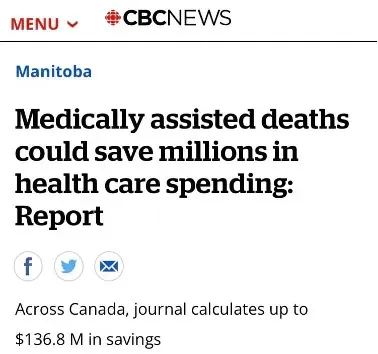Table of Contents
Hendrik van der Breggen
Hendrik van der Breggen, PhD, is a retired philosophy professor who lives in Steinbach, Manitoba, Canada. Hendrik is author of the book Untangling Popular Pro-Choice Arguments: Critical Thinking about Abortion.
“Medically assisted deaths could save millions in health care spending” – so stated the headline of Canadian Broadcasting Corporation News on January 23, 2017, six months after Canada legalized Medical Assistance in Dying/MAID (a euphemism for physicians killing patients).

If that’s a justification of MAID (and for some it is), it’s sheer wickedness.
First, some perspective is in order. Here is the MAID casualty list for Canada thus far:
- 2016 – 1,018
- 2017 – 2,838
- 2018 – 4,480
- 2019 – 5,661
- 2020 – 7,603
- 2021 – 10,064
- 2022 – Number is yet to be calculated, but the trend is dark.
The above numbers are from the Canadian government document “Third annual report on Medical Assistance in Dying in Canada 2021”.
I should note that I wonder about the accuracy of this report. I suspect the numbers may be higher. Why? Because, according to the College of Physicians and Surgeons of Ontario: “When completing the death certificate physicians: a. must list the illness, disease or disability leading to the request for MAID as the cause of death; and b. must not make any reference to MAID or the drugs administered on the death certificate.”
This erodes trust in at least some (a lot?) of Canada’s doctors.
But trust in Canada’s federal government (led by Prime Minister Justin Trudeau) is also eroding.
Canada’s federal government supports MAID and, in recent years, has been making MAID accessible to more and more people by loosening restrictions. At first, MAID was only supposed to end the suffering of the terminally ill. But now reasonably foreseeable death is no longer a requirement.
In fact, in March 2022 restrictions were broadened so people with disabilities or people struggling with pain could access MAID, even if not close to death. And in March 2023 the procedure will be available to the mentally ill. And now there is discussion about offering MAID to “mature minors”.
This brings me to my main point, which is hugely significant: Canada’s federal government supports the “choice” for medically-assisted suicide before ensuring Canadians actually have real options.
It turns out that the vast majority of Canadians don’t have access to good palliative care (palliative care is care that optimizes quality of life and mitigates suffering). Also, Canadian veterans (at least six so far) have been offered MAID to deal with their suffering instead of actually helping them (one veteran was offered MAID as an alternative to a wheelchair ramp/elevator). And there has been a case in which a disabled man successfully began the application process for MAID because he had trouble paying his bills and was afraid of becoming homeless.
This last case caught the attention of local news and, happily, a kind stranger set up a GoFundMe page for the disabled man and he subsequently changed his mind about accessing MAID (at least for now).
The GoFundMe case is heart-warming – and revealing. It sheds much-needed light onto Canada’s dismal and dark dismissal of life.
Surely it is an evil to offer a “choice” between suffering and death which neglects the option of actual assistance in living.
My suggested solution: Instead of justifying or encouraging suicide in terms of saving health care dollars, Canadians should demand their government cut frivolous spending – and redirect it to people who actually need it to live.
Think of the actual help that could be given to people if Canada’s government stopped squandering taxpayers’ dollars on things like the following:
- our prime minister’s C$1.6 million family trip to India (complete with personal celebrity chef)
- our federal government’s $8.1 million temporary hockey rink in front of Ottawa’s parliament buildings (on which only relatively few skated)
- our prime minister’s $610 million waste of calling a not-needed federal election during a pandemic
- government officials flying across the ocean to climate conferences in fuel-guzzling jets
- a government official staying in a $6,000 per night hotel for five nights
- funding a boat-sized rubber duck
- etc, etc
And maybe Canada should say yes to some pipelines that would generate huge revenues and increase tax-dollar funding (billions?) for, say, hospitals, ICUs, palliative care, hospices, mental health services and life-enhancing help for people with disabilities.









